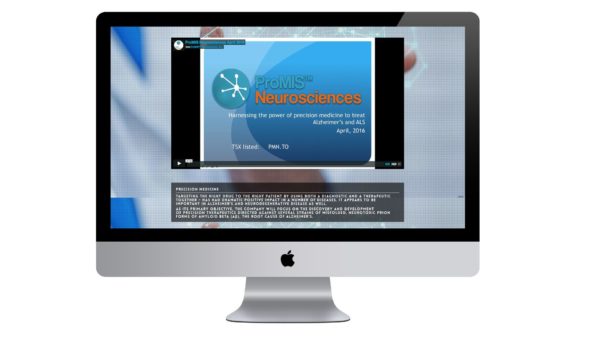
 New data from ProMIS Neurosciences (ProMIS Neuroscienes Stock Qutoe, Chart, News: TSX:PMN) has Mackie Research Capital analyst André Uddin feeling positive about the potential of the company’s lead product candidate for Alzheimer’s disease, PMN310.
New data from ProMIS Neurosciences (ProMIS Neuroscienes Stock Qutoe, Chart, News: TSX:PMN) has Mackie Research Capital analyst André Uddin feeling positive about the potential of the company’s lead product candidate for Alzheimer’s disease, PMN310.
On Tuesday, ProMIS Neurosciences announced that its lead product candidate for Alzheimer’s disease, PMN310, showed the desired binding profile of selectively targeting amyloid beta oligomers in a preclinical study directly comparing PMN310 with other amyloid beta-directed antibodies for Alzheimer’s disease.
“We are pleased to confirm the selective binding of PMN310 to amyloid beta oligomers, a root cause of Alzheimer’s disease,” said CEO Elliot Goldstein. “Results of prior clinical studies with other amyloid beta antibody therapeutics clearly showed that antibodies targeting amyloid beta monomer have consistently been ineffective, while those targeting amyloid beta fibrils, the main component of plaque, are associated with a dose limiting toxicity of brain swelling. Taken together, results of prior clinical trials indicate the best-in-class target product profile is selective binding of toxic amyloid beta oligomers.”
Uddin says there is increasing evidence that Alzheimer’s is primarily caused by primarily caused by soluble toxic amyloid beta oligomers, as opposed to the classic theory which argues that the primary cause is plaques. He says this favours ProMIS Neurosciences ideas.
“The development of PMN 310 is based on the amyloid beta oligomer theory,” the analyst explains. “Given the favourable pre-clinical results, we remain confident that PMN310 should have better efficacy and safety than Biogen’s aducanumab and PMN310 has the best-in-class potential to treat Alzheimer’s. The positive pre-clinical data should also facilitate a potential collaboration deal, which could come in as early as 2018 – we have assumed 2019 in our forecasts.”
In a research update to clients Tuesday, Uddin maintained his “Speculative Buy” rating and one-year price target of $0.50 on ProMIS Neurosciences, implying a return of 113 per cent at the time of publication.
Leave a Reply
You must be logged in to post a comment.




 Share
Share Tweet
Tweet Share
Share




Comment